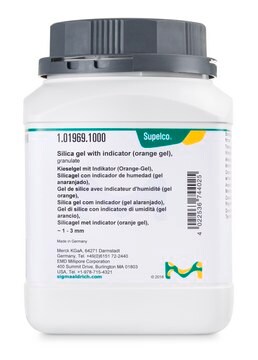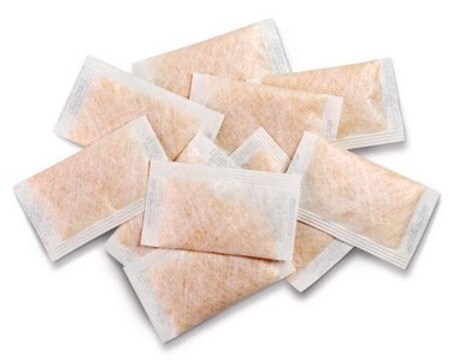1.01905
Silica gel
granules, desiccant ~ 0.2 - 1 mm
About This Item
Polecane produkty
Poziom jakości
Postać
granular
siła działania
>5000 mg/kg LD50, skin (Rabbit)
powierzchnia
700 m2/g
strata
≤2.0% loss on drying, 180°C
wielkość cząstki
0.2-1 mm
wielkość porów
2.0-2.5 nm
pH
7 (20 °C, 100 g/L in H2O, slurry)
tw
2230 °C
mp
>1600 °C
gęstość nasypowa
200‑800 kg/m3
temp. przechowywania
15-25°C
ciąg SMILES
O=[Si]=O
InChI
1S/O2Si/c1-3-2
Klucz InChI
VYPSYNLAJGMNEJ-UHFFFAOYSA-N
Szukasz podobnych produktów? Odwiedź Przewodnik dotyczący porównywania produktów
Zastosowanie
- Stability and Structure of Potentially Atmospherically Relevant Glycine Ammonium Bisulfate Clusters: This research examines the complex interactions and stability of atmospheric aerosols involving sulfuric acid, providing insights valuable for environmental scientists and chemists studying atmospheric chemistry and pollution mitigation strategies (Hariharan et al., 2024).
- Nanostructured Niobium and Titanium Carbonitrides as Electrocatalyst Supports: Discusses the role of sulfuric acid in synthesizing nanostructured materials for energy applications, relevant for material scientists and researchers in renewable energy technologies (McLeod et al., 2024).
- Synthesis and characterization of hydroxyapatite nanoparticles from calcium hydroxide fouled with gases evolved from the smokestack of the glass industry: Highlights the utility of sulfuric acid in the synthesis of nanoparticles for industrial applications, crucial for researchers in materials science and industrial manufacturing (Abdelmoaty and Mousa, 2024).
- Nucleophilic hydrolysis enables HF-etched MXene kilofarad specific capacitance and excellent rate performance: Demonstrates the application of sulfuric acid in enhancing the performance of electrochemical storage devices, relevant for material scientists working on advanced battery technologies (Xu et al., 2024).
Komentarz do analizy
Loss on drying (180 °C): ≤ 2.0 %
Water absorption capacity (24 hrs.,80 % relative humidity): ≥ 27.0 %
Kod klasy składowania
13 - Non Combustible Solids
Klasa zagrożenia wodnego (WGK)
nwg
Temperatura zapłonu (°F)
Not applicable
Temperatura zapłonu (°C)
Not applicable
Certyfikaty analizy (CoA)
Poszukaj Certyfikaty analizy (CoA), wpisując numer partii/serii produktów. Numery serii i partii można znaleźć na etykiecie produktu po słowach „seria” lub „partia”.
Masz już ten produkt?
Dokumenty związane z niedawno zakupionymi produktami zostały zamieszczone w Bibliotece dokumentów.
Klienci oglądali również te produkty
Nasz zespół naukowców ma doświadczenie we wszystkich obszarach badań, w tym w naukach przyrodniczych, materiałoznawstwie, syntezie chemicznej, chromatografii, analityce i wielu innych dziedzinach.
Skontaktuj się z zespołem ds. pomocy technicznej




